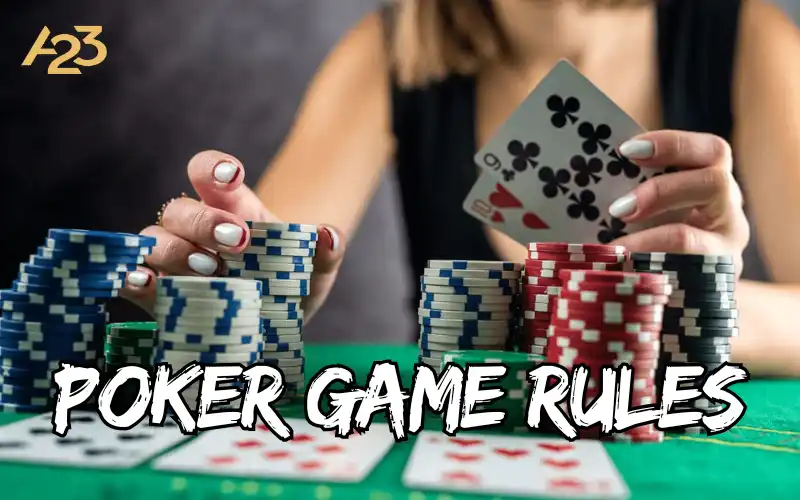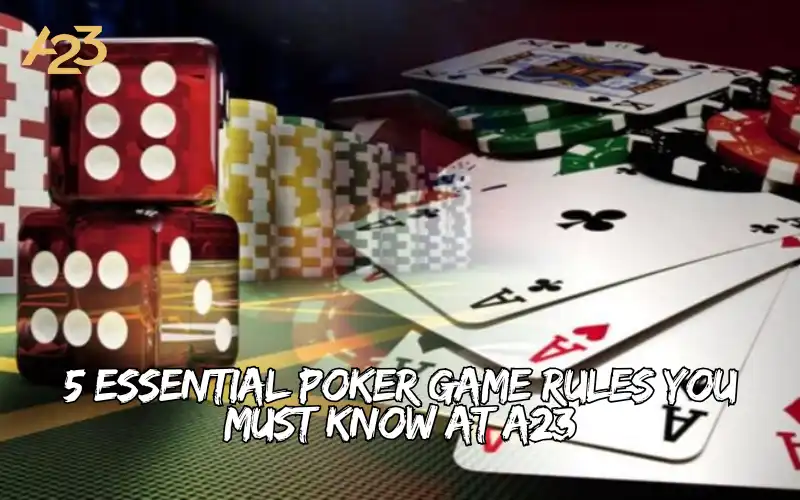Poker is one of the most popular card games in the world, known for its blend of skill, strategy, and chance. Whether you’re a seasoned player or a newcomer, understanding the essential rules of poker is crucial for success. At A23, a leading online poker platform, players can enjoy a variety of poker games, from Texas Hold’em to Omaha. In this article, we will explore five essential poker game rules you must know to enhance your gameplay and increase your chances of winning at A23.
1. Understanding Hand Rankings
The Importance of Hand Rankings
One of the fundamental aspects of poker is understanding hand rankings. Knowing which hands beat others is crucial for making informed decisions during the game. Here’s a breakdown of the standard poker hand rankings, from highest to lowest:
- Royal Flush: A, K, Q, J, 10, all of the same suit.
- Straight Flush: Five consecutive cards of the same suit.
- Four of a Kind: Four cards of the same rank.
- Full House: Three of a kind plus a pair.
- Flush: Five cards of the same suit, not in sequence.
- Straight: Five consecutive cards of different suits.
- Three of a Kind: Three cards of the same rank.
- Two Pair: Two pairs of different ranks.
- One Pair: Two cards of the same rank.
- High Card: The highest card in your hand if no other hand is made.
Why Hand Rankings Matter
Understanding hand rankings is essential for several reasons:
- Decision Making: Knowing the strength of your hand helps you decide whether to bet, call, raise, or fold.
- Reading Opponents: By understanding hand rankings, you can better assess the potential hands your opponents may have based on their betting patterns.
- Strategic Play: Hand rankings inform your strategy, allowing you to play aggressively with strong hands and conservatively with weaker ones.
2. The Betting Rounds
Overview of Betting Rounds
In poker, betting rounds are crucial to the game’s structure. Each round allows players to make decisions based on their hands and the community cards. Here’s a breakdown of the typical betting rounds in Texas Hold’em, one of the most popular poker variants available at A23:
- Pre-Flop: After players receive their hole cards, the first round of betting begins. Players can choose to call, raise, or fold based on the strength of their hands.
- Flop: Three community cards are dealt face-up on the table. A second round of betting follows, starting with the player to the left of the dealer.
- Turn: A fourth community card is dealt face-up. Another round of betting occurs, allowing players to reassess their hands.
- River: The fifth and final community card is dealt. The last round of betting takes place, giving players one final chance to bet or fold.
Betting Options
During each betting round, players have several options:
- Check: If no one has bet, a player can check, passing the action to the next player.
- Call: Matching the current bet to stay in the hand.
- Raise: Increasing the current bet, forcing other players to match the new amount to continue.
- Fold: Discarding your hand and forfeiting any chance of winning the pot.
Importance of Betting Rounds
Understanding the betting rounds is essential for several reasons:
- Strategic Decisions: Each round provides an opportunity to assess your hand and the potential of the community cards.
- Pot Control: Knowing when to bet or check can help you control the size of the pot, especially with weaker hands.
- Reading Opponents: Observing how opponents bet during each round can provide valuable insights into their hand strength.
3. Position Matters
Understanding Player Position
In poker, your position at the table significantly impacts your strategy and decision-making. The position refers to where you sit in relation to the dealer button, which rotates clockwise after each hand. Here are the key positions:
- Early Position (EP): Players who act first in the betting round. This position is considered the most challenging, as you have less information about other players’ actions.
- Middle Position (MP): Players who act after the early position but before the late position. This position allows for more strategic play.
- Late Position (LP): Players who act last in the betting round. This position is advantageous, as you can observe how other players act before making your decision.
Why Position Matters
Understanding your position is crucial for several reasons:

- Informed Decisions: Players in late position have more information about their opponents’ actions, allowing for better decision-making.
- Aggressive Play: Players in late position can play more aggressively, as they can assess the strength of their opponents’ hands before acting.
- Pot Control: Knowing your position helps you control the pot size and manage your bets effectively.
4. Bluffing and Reading Opponents
The Art of Bluffing
Bluffing is a fundamental aspect of poker that can lead to significant wins when executed correctly. Bluffing involves making your opponents believe you have a stronger hand than you actually do. Here are some tips for effective bluffing:
- Choose the Right Moment: Bluffing is most effective when the board presents a strong possibility of a high hand. For example, if the community cards suggest a potential straight or flush, you can represent that hand.
- Consider Your Opponents: Bluffing against inexperienced players may not be effective, as they may call your bets regardless of their hand strength. Bluff against players who are more likely to fold.
- Maintain Consistency: Your betting patterns should be consistent. If you suddenly make a large bet after playing conservatively, it may raise suspicion.
Reading Opponents
Being able to read your opponents is just as important as bluffing. Here are some tips for reading opponents effectively:
- Observe Betting Patterns: Pay attention to how your opponents bet. Are they aggressive or passive? Do they tend to bluff often? Understanding their tendencies can help you make informed decisions.
- Watch for Physical Tells: In live poker, players may exhibit physical tells when they have a strong or weak hand. Look for changes in behavior, such as fidgeting or avoiding eye contact.
- Consider Their Position: Take note of your opponents’ positions at the table. Players in early position may have stronger hands, while those in late position may be more likely to bluff.
5. Know When to Fold
The Importance of Folding
One of the most critical skills in poker is knowing when to fold. Many players struggle with this aspect, often staying in hands longer than they should. Here are some tips for recognizing when to fold:
- Assess Your Hand Strength: If your hand is weak and the community cards do not improve it, it may be time to fold. Don’t be afraid to let go of a hand that isn’t working out.
- Consider the Pot Odds: Pot odds refer to the ratio of the current size of the pot to the size of the bet you must call. If the odds do not justify a call based on your hand strength, it’s better to fold.
- Recognize Aggressive Betting: If an opponent is betting aggressively, it may indicate they have a strong hand. If you’re unsure about your hand, folding can save you from losing more chips.
Embrace the Fold
Folding is not a sign of weakness; it’s a strategic decision that can save you money in the long run. By recognizing when to fold, you can preserve your chips for better opportunities and improve your overall game.
Conclusion
Understanding the essential rules of poker is crucial for success at A23. By familiarizing yourself with hand rankings, betting rounds, player positions, bluffing techniques, and the importance of folding, you can enhance your gameplay and increase your chances of winning. Poker is a game of skill, strategy, and psychology, and mastering these fundamental rules will set you on the path to becoming a successful player.
So, whether you’re playing Texas Hold’em, Omaha, or any other variant, keep these five essential poker game rules in mind as you navigate the exciting world of poker at A23. Good luck at the tables, and may your poker journey be filled with thrilling wins and unforgettable moments!








